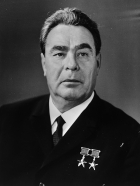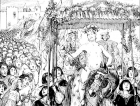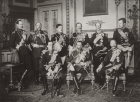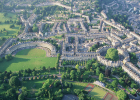Europe
From the fall of Napoleon to Revolution in Russia and from the rise of Hitler to the fall of the Berlin Wall this period is one of major upheaval in Europe. We see the collapse of monarchies and empires and the changing status of women and working men. This is a time that witnesses the mass displacement of peoples and genocide on a scale never seen before it is also a time that sees changes in medicine and technology that make fundamental changes to our everyday lives. Read more
Sort by:
Date (Newest first) | Title A-Z
Show:
All |
Articles |
Podcasts |
Multipage Articles
-

Introductory film: Brezhnev - Interpretations
ArticleClick to view -

Recorded webinar: Mapping uncertainty - Holocaust Memorial Day 2025
ArticleClick to view -

Introductory film: Lenin - Interpretations
ArticleClick to view -

Introductory film: Khrushchev - Interpretations
ArticleClick to view -

Women and the French Revolution: the start of the modern feminist movement
ArticleClick to view -

Film: Heligoland: Britain, Germany, and the Struggle for the North Sea
ArticleClick to view -

Evelyn Waugh’s books on the Italo-Ethiopian War, 1935–36
ArticleClick to view -

Recorded Webinar: Ukraine and the Soviet Politics of Empire
ArticleClick to view -

Recorded webinar: Ordinary people - Holocaust Memorial Day 2023
ArticleClick to view -

What did ‘Mature Socialism’ mean for the Soviet Union?
ArticleClick to view -

Introductory Film: Germany 1871-1945
ArticleClick to view -

The throne and the fairy tellers
ArticleClick to view -

My Favourite History Place: the Berlin Wall
ArticleClick to view -

After the revolution: did Cromwell, Washington and Bonaparte betray revolutionary principles?
ArticleClick to view -

How Sweden almost became a nuclear-armed state – and why it didn’t
ArticleClick to view -

Sweden’s forgotten revolution
ArticleClick to view -

Virtual Branch recording: Why has Monarchy survived in Europe?
ArticleClick to view -

The Great Spa Towns of Europe: a UNESCO World Heritage Site
ArticleClick to view -

Recorded webinar: Using 'One Day' to explore the actions that helped to lead to the Holocaust and actions of genocide
ArticleClick to view -

Film: The Partitions of Poland-Lithuania (1772-1795)
ArticleClick to view

